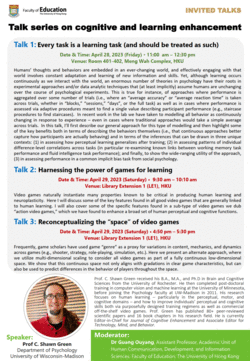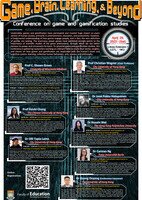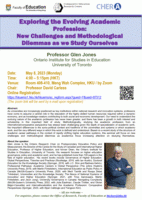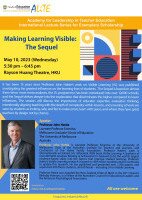Seminar: Every task is a learning task (and should be treated as such)
Seminar
Date
April 28, 2023 (Fri)
Location
Time
11:00 AM - 12:30 PM
Speaker

Every task is a learning task (and should be treated as such)
Professor C. Shawn Green
Department of Psychology
University of Wisconsin-Madison
April 28, 2023 (Friday)
11:00 am – 12:30 pm
Room 401-402, Meng Wah Complex, HKU
Please register at:https://hkuems1.hku.hk/hkuems/ec_regform.aspx?guest=Y&ueid=87407
Abstract:
Humans’ thoughts and behaviors are embedded in an ever-changing world, and effectively engaging with that world involves constant adaptation and learning of new information and skills. Yet, although learning occurs continuously as we interact with the world, an enormous number of theories in psychology have their roots in experimental approaches and/or data analytic techniques that (at least implicitly) assume humans are unchanging over the course of psychological experiments. This is true for instance, of approaches where performance is aggregated over some number of trials (i.e., where an “average accuracy” or “average reaction time” is taken across trials, whether in “blocks,” “sessions,” “days”, or the full task) as well as in cases where performance is assessed via adaptive procedures meant to find a single value describing participant performance (e.g., staircase procedures to find staircases). In recent work in the lab we have taken to modelling all behavior as continuously changing in response to experience – even in cases where traditional approaches would take a simple average across trials. In this talk, I’ll first describe our general approach for this type of modelling and then highlight some of the key benefits both in terms of describing the behaviors themselves (i.e., that continuous approaches better capture how participants are actually behaving) and in terms of the inferences that can be drawn in three unique contexts: (1) in assessing how perceptual learning generalizes after training; (2) in assessing patterns of individual difference-level correlations across tasks (in particular re-examining known links between working memory task performance and fluid intelligence task performance); and finally, to show the wide-ranging utility of the approach, (3) in assessing performance in a common implicit bias task from social psychology.
About the speaker:
Prof. C. Shawn Green received his B.A., M.A., and Ph.D in Brain and Cognitive Sciences from the University of Rochester. He then completed post-doctoral training in computer vision and machine learning at the University of Minnesota, before joining the Psychology faculty at UW-Madison in 2011. His research focuses on human learning – particularly in the perceptual, motor, and cognitive domains – and how to improve individuals’ perceptual and cognitive skills both via purposefully designed training regimens as well as commercial off-the-shelf video games. Prof. Green has published 80+ peer-reviewed scientific papers and 16 book chapters in his research field. He is currently Editor-in-Chief for Journal of Cognitive Enhancement and Associate Editor for Technology, Mind, and Behavior.
Moderator:
Dr Guang Ouyang, Assistant Professor, Academic Unit of Human Communication, Development, and Information Sciences, Faculty of Education, HKU
~ All are welcome ~
For enquiries, please contact the Office of Research, Faculty of Education athkchow@hku.hk



